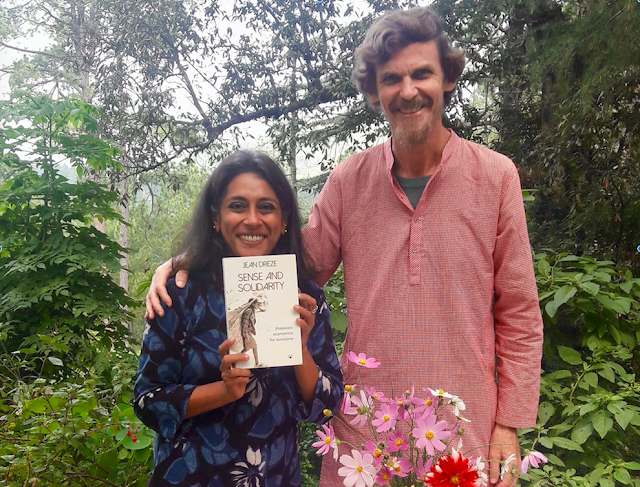Jean Dreze was gifted the first copy of his new book, Sense and Solidarity: Jholawala Economics for Everyone, at a pine-cone studded book-launch yesterday. The launch took place at the corporate headquarters of Permanent Black in Ranikhet, Uttarakhand.
A huge audience of deodar trees attended, listening to every word in rapt silence.
Chief Guest Prakriti Mukerjee has been among Jean's band of road scholars, being one of the many students who camped for days in remote villages working on NREGA and PDS surveys through baking summer weather. She is now Research and Communication Officer at Lok Chetna Manch, Ranikhet, and she took time out of her busy schedule to hand over a be-ribonned copy of the book to Jean, as pictured below.
Jean's new book, a superb combination of scholarship, passion, and commitment, is that rarest of things: a work of scholarship that is gripping and accessible. Angus Deaton, Nobel Laureate, who calls Dreze "one of the world's finest development economists", has described the essays as "beautiful", and says they "illuminate the whole range of social policy in India."
Jean looked pretty happy once he'd got the book out of its red ribbons.
The man in
the checked shirt to the extreme right is Rukun Advani, Jean's publisher
and editor. Their almost daily correspondence during the making of this
book would provide material enough for an entertaining little volume; however,
editorial communication at Permanent Black is covered by the Official Secrets Act.
We can tell that the designer and general dogsbody at the press, Anuradha Roy, didn't do much more than grin in a dazed fashion.
The support staff at Permanent Black appeared more interested in the small eats than in the book, but as publishing veterans are aware, that is the norm at book launches.
We can tell that the designer and general dogsbody at the press, Anuradha Roy, didn't do much more than grin in a dazed fashion.
The support staff at Permanent Black appeared more interested in the small eats than in the book, but as publishing veterans are aware, that is the norm at book launches.
The book will be in the market from 25th September 2017.
We will post more information about it in the days to come.






Comments